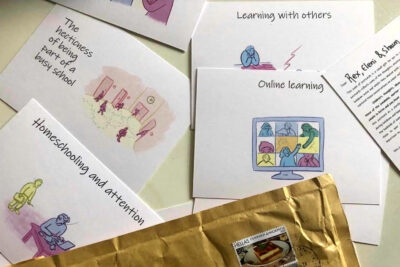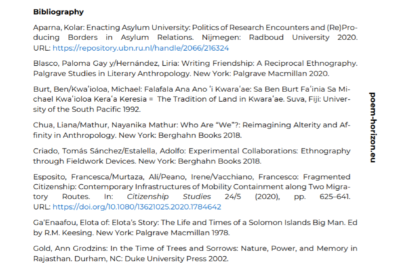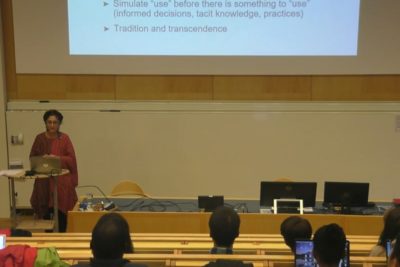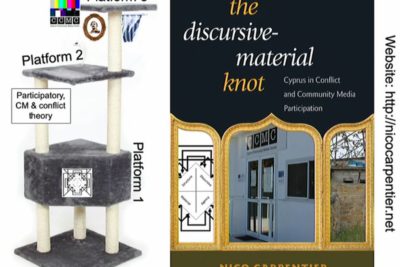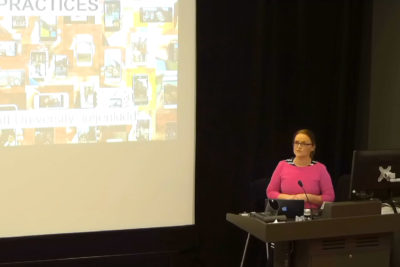Impact
Creating impact is an important issue in our POEM research. Impact has many forms and faces, beyond performance metrics it is hard to quantify, however often the non-metrical effects are the most relevant ones. Here we provide examples of POEM impact.
Publications
POEM fellows are encouraged to be published in international journals, relevant online platforms etc. For an alphabetical listing of publications from fellows and supervisors, please see here.
Boersma, Susanne (2020). Facilitators of Integration? The Potential Role of Museums in Integration as a Two-Way Process. In: Museological Review (24). Leicester, University of Leicester, pp. 114-124.
Boersma, Susanne (2021). Aandacht voor ‘de vluchteling’ – Stereotype represenatie van vlucht in musea. A spotlight on ‘the refugee’ – Stereotypical representation of flight migration in museums. In: Boekman Extra #23. Boekmanstichting.
Boersma, Susanne [2023]. Competing narratives – Stories of forced migrants within ethnographic museums. In: Zeitschrift für Ethnologie (Special Issue: ‘Collaborative Projects as an avenue to transgress Western Epistemologies’) [forthcoming, Summer 2023].
Chahine, Anne [2023]. Future Memory Work: Unsettling Temporal Othering through Speculative Research Practices. In: Qualitative Research. [Accepted].
Jensen, Laura Lennert & Anne Chahine [2022] It’s a Bit like Saying: I Don’t See Colour’ — Unpacking Coloniality in Kalaallit Nunaat (Greenland) through Epistolary Collaborative Practice. In: Collaborative Anthropologies 15 (1). [in press].
Jensen, Laura Lennert, Anne Chahine, and Vivi Vold (2022). Co-Creating Pluriversal Worlds: Reflections on the Virtual Exhibition Decolonial Movements in Kalaallit Nunaat (Greenland). In: KULT. Postkolonial Temaserie. 17 (A special issue on Greenland): pp. 1–28.
Kambunga, Asnath Paula & Rachel Charlotte Smith, Heike Winschiers-Theophilus (2022) Extending Temporalities in Participatory Design [under review].
Kambunga, Asnath Paula & Rachel Charlotte Smith, Heike Winschiers-Theophilus, Ton Otto. (2022) Decolonial Design Practices: Creating Safe Spaces for Plural Voices on Contested Pasts, Presents and Futures. [under review].
Kist, Cassandra (2020). Museums, Challenging Heritage and social media During COVID-19. In: Museum and Society 18 (3), pp. 345–348.
Kist, Cassandra (2022). Repairing online spaces for safe outreach with older adults. In: Museums and Social Issues 2022 [upcoming].
Moraitopoulou, Elina (2022). Engaging Children and Young People in the Co-Production of Memory and Culture through Multimodal Ethnographic Research. In: Jeunesse: Young People, Texts, Cultures, 13(2), pp. 118–140.
Theocharidou, Myrto (2021). interart.cy Μια ψηφιακή χαρτογράφηση των Κυπρίων δημιουργών του εξωτερικού/ A digital database of Cypriot Artists living abroad. In: Interart CY: a database of Cypriots artists living abroad, 2021(1).
Tran, Quoc Tan (2022). „Working things out” and the infrastructural qualities of museum documentation. In: Special Issue “Repair.” Museum & Social Issues. [upcoming].
Tzouganatou, Angeliki (2021). Openness and privacy in born-digital archives: reflecting the role of AI development. In: AI & Society: Knowledge, Culture and Communication Journal.
Widmaier, Lorenz (2020). Da ist noch etwas für die Ewigkeit: Das digitale Erbe und seine Bedeutung für Trauer und Erinnerung. In: Bestattungskultur (6). Düsseldorf, Bundesverband Deutscher Bestatter e.V., pp. 38-40.
Widmaier, Lorenz (2021). „So viel vom Leben findet in den Geräten statt …“ Ein Leitfaden zur Nachlassvorsorge für digitale Daten. In: Bestattungskultur, 2021(4), FVB, pp. 34-36.
Wittenzellner, Jana/ Boersma, Susanne (Eds.) (2021). The Better Life – Photographs by Göran Gnaudschun. Museum Europäischer Kulturen, Vol. 25, Petersburg: Imhof Verlag.
Edenheiser, Iris/ Tietmeyer, Elisabeth/ Boersma, Susanne (Eds.) (2020). What’s Missing? Collecting and Exhibiting Europe. Museum Europäischer Kulturen, Vol. 24. Berlin: Reimer Verlag.
Boersma, Susanne (2021). Exhibiting Migration. In: Wittenzellner, Jana/ Boersma, Susanne (Eds.) (2021). The Better Life – Photographs by Göran Gnaudschun. Museum Europäischer Kulturen, Vol. 25, Petersburg: Imhof Verlag, pp. 108-112.
Boersma, Susanne/ Chahine, Anne/ Mucha, Franziska/ Zwart, Inge (2021). The Archive of Forgotten Memories: A Participatory Process of Reflexivity. In: Edenheiser, I./ Tietmeyer, E./ Boersma, S. (Eds.): What’s Missing? Collecting and Exhibiting Europe. Museum Europäischer Kulturen, Vol. 24. Berlin: Reimer Verlag, pp. 241-245.
Kist, Cassandra (2021). Museum Social Media Practices: In Need of Repair? In: M. Shehade & T. Stylianou-Lambert (Eds.), Emerging Technologies and the Digital Transformation of Museums and Heritage Sites, Springer International Publishing, pp. 282–293.
Kist, Cassandra/ Mucha, Franziska (2021). Digitally enabled participation in exhibitions: empowering social platforms. In: Darius, H./ Fackler, G. (Eds.): Exponat – Raum – Interaktion. Perspektiven für das Kuratieren digitaler Ausstellungen. Göttingen, Vandenhoek & Ruprecht.
Mucha, Franziska/ Oswald, Kristin (2021). Partizipationsorientierte Wissensgenerierung und Citizen Science im Museum. In: Mohr, H./ Modarressi-Tehrani, D. (Eds.). Museen der Zukunft. Trends und Herausforderungen eines innovationsorientierten Kulturmanagements. Bielefeld, Transkript-Verlag.
Tran, Quoc Tan (2022). From Index Cards to Digital Catalogues: Incomplete Object Documentation as Reflection Space. In: D. Hansjörg, B. Göbel, L.-C. Koch, S. Schütze & A. von Poser (Eds.), Collections as Relations: Belonging, Cultural Heritage, and Knowledge Infrastructures [upcoming].
Kambunga, Asnath Paula (2020). Co-creating Futures with Namibian Youth. In: PIVOT 2020.
Kambunga, Asnath Paula (2020). Postcolonial narratives of the born frees: an interactive exhibition codesigned with Namibian youth. In: 5th Association of Critical Heritage Studies Biennial Conference, pp. 257.
Kambunga, Asnath Paula/ Rachel Charlotte Smith/ Heike Winschiers-Theophilus/ Nathaly Pinto, Xavier Barriga Abril/ Laura Boffi/ Emmanuel Dzisi/ Tariq Zaman/ Desiree Hernandez Ibinarriaga, Anne Chahine/ Laura Jensen & Vivi Vold (2021). Pluriversal Design: A Virtual Decolonising Exhibition. In: The 10th International Conference on Communities and Technologies.
Kambunga, Asnath Paula/ Winschiers-Theophilus, Heike/ Smith, Rachel Charlotte/ Wandai, Peter/ Antonio, Holger/ Shalumbu, Bernaddete/ Muronga, David/ Kaulbach, Peter/ Virmasalov, Veera (2020). Challenging authorities: a postcolonial interactive exhibition co-designed by Namibian born-frees. In: Israel, Habakuk Johann/ Kassung, Christian/ Sieck, Jürgen (Ed.): Kultur und Informatik. Extended Reality (= Culture and Computer Science – Extended Reality. XVIII. International Conference on Culture and Computer Science 2020). vwh: Berlin 2020, pp. 215-229.
Kambunga, Asnath Paula/ Winschiers-Theophilus, Heike/ Smith, Rachel Charlotte (2020). Participatory Memory Making: Creating Postcolonial Dialogic Engagements with Namibian Youth. In: Proceedings of the Designing Interactive Systems Conference 2020 (DIS ’20. Designing Interactive Systems Conference 2020), Eindhoven.
Kambunga, Asnath Paula/ Winschiers-Theophilus, Heike/, Muashekele, C. P., Kalwenya, V., Katale, H., Kakoto, T., Iyambo, S., Shekuza, D., & Simeon, S. (2021). Virtual exhibition. In: The International Visual Methods Conference (IVMC), Cape Town, South Africa.
Kist, Cassandra., Tran, Quoc Tan. (2021). Breaking Boundaries, Creating Connectivities: Enabling Access to Digitized Museum Collections. In: Rauterberg, M. (Eds) Culture and Computing. Interactive Cultural Heritage and Arts. HCII 2021. Lecture Notes in Computer Science, vol 12794. Springer, Cham.
Krueckeberg, Jennifer (2021). Youth and Algorithmic Memory: Co-producing Personal Memory on Instagram. In: HCII 2021: Culture and Computing. Design Thinking and Cultural Computing, pp. 253-264.
Krueckeberg, Jennifer/Tzouganatou, Angeliki (2021). FROM MONOPOLIZING MEMORY TO CO-CREATING IT: OPENNESS AND EQUITY IN THE DIGITAL ECOSYSTEM. In: AoIR Selected Papers of Internet Research.
Mucha, Franziska (2021) Participation in Cultural Heritage Hackathons: ‘Carsharing’ Between ‘Meaningful Nonsense’ and ‘Unromantic’ Networking. In: Emerging technologies and the digital transformation of museums and heritage sites: First international conference, RISE IMET 2021, Nicosia, Cyprus, June 2-4, 2021: proceedings, Switzerland: Springer, pp. 269–281.
Smith, Rachel Charlotte/ Heike Winschiers-Theophilus/ Daria Loi, Rogerio de Paula/ Asnath Paula Kambunga/ Marly Muudeni Samuel & Tariq Zaman. (2021). Decolonizing Design Practices: Towards Pluriversality. In: Extended Abstracts of the 2021 CHI Conference on Human Factors in Computing Systems, pp. 1-5.
Smith, Rachel Charlotte/ Winschiers-Theophilus, Heike/ Kambunga, Asnath Paula (2021). Participatory Memory Making – Namibian youth as Agents for Change. In: Proceedings of the 3rd AfriCHi Conference 2021, pp. 1-13.
Smith, Rachel Charlotte/ Winschiers-Theophilus, Heike/ Kambunga, Asnath Paula/ Krishnamurthy, Sarala (2020). Decolonizing Participatory Design: Memory Making in Namibia. In: Proceedings of the 16th Participatory Design Conference 2020 – Participation(s) Otherwise. Manizales, Association for Computing Machinery, pp. 96-106.
Smith, Rachel Charlotte/ Winschiers-Theophilus, Heike/ Loi, Doria/ Kambunga, Asnath Paula/ Samuel, Marly Muudeni/ de Paula, Rogerio (2020). Decolonising Participatory Design Practices: Towards Participations Otherwise. In: Proceedings of the 16th Participatory Design Conference 2020 – Participation(s) Otherwise. Manizales, Association for Computing Machinery, pp. 206-209.
Tzouganatou, Angeliki (2021). “On Complexity of GLAMs’ Digital Ecosystem: APIs as Change Makers for Opening up Knowledge”. In: HCII 2021: Culture and Computing. Design Thinking and Cultural Computing, pp. 348-359.
Krueckeberg, Jennifer (2021). Neoliberal Morality: Shame and Self-Improvement as Control over Young People’s Digital Productivity. Platypus- THE CASTAC BLOG.
Widmaier, Lorenz/Lander, Heike (2020). Die digitale Trauer ersetzt die analoge nicht. Heike-Lander.de.
Clark, Hannah-Louise/ Gambell, Sarah/ Mucha, Franziska/ MacLean, Robert/ Rankin, Moira/ Rowan, Rachel (2019). Global History Hackathon Playbook Version 1.1: Practical Guidance for Hosting a Hackathon for the Arts, Humanities, and Social Sciences. Glasgow, University of Glasgow.
Zengenene, Dydimus/ Groot, Tim/ Minihold, Sophie/ Robinson, Jessica/ Schneider, Manuel/ Sleigh, Joanna (2019): Russia, Twitter & Authenticity: Establishing Credibility Metrics. In: Digital Methods Initiative Wiki. Glasgow, University of Glasgow.
Zwart, Inge., Boersma, Susanne, Mucha, Franziska, & Kist, Cassandra (2021). Careful participation in museums. Book Review Essay, In: Museum Worlds, 9(1), pp. 208-214.
The Participatory Memory Practices series provides a forum for research on a crucial challenge in pluralistic societies: the organisation of open, participatory and socially inclusive memory practices in contemporary digital media environments.
Advancing inter- and transdisciplinary research, the series examines how and in which ways memory practices in digital media are open for engagement of people from diverse backgrounds. It analyses the modalities of memory making and how they can enable institutional and public memory making with a broad spectrum of people and groups in civil society at local, trans-local, national and transnational levels. The series will examine the mediatized character of memory making, whilst also considering what sort of obstacles and potential benefits emerge from participatory memory making. As a whole, the series aims to be a source of knowledge and ideas for creating socially inclusive, sustainable and future-oriented memory practices. It will publish forward-looking, empirically grounded research monographs and edited collections that set the multidisciplinary research agenda for studying heritage in contemporary digital media as an element and a driver of cultural and social change.
Titles within the Participatory Memory Practices series will appeal to academics and students working in memory studies, heritage studies, museum studies, information studies, archival studies, design anthropology and participatory design, social and cultural anthropology, diversity studies, migration studies, media studies and sociology.
The Series Editors welcome proposals that explore the political and social significance of memory institutions and their ethical implications for participatory and socially inclusive memory practices in contemporary digitalized and pluralistic societies. If you have an idea for a book that you think would be appropriate for the series, then please contact the Series Editors and they will be able to provide some initial feedback and information about next steps. |
Routledge Book Series – Participatory Memory Practices: Digital Media, Design, Futures
Boersma, Susanne [2022, submitted]: The Aftermaths of Participation. Outcomes and Consequences of Participatory Work with Forced Migrants in Museums. Transcript, Bielefeld.
Kambunga, Asnath Paula (2022, forthcoming): Decolonising Design: Futures Memory-Making with Namibian Born Frees. PhD thesis, Aarhus University. [forthcoming]
Kist, Cassandra Jane (2022, forthcoming): Crafting Museum Social Media for Social Inclusion Work. PhD thesis, University of Glasgow.
Krueckeberg, Jennifer [2022, submitted]: Assembling Remembering – Youth and Digital Memory Practices. PhD thesis, University of Hamburg.
Mucha, Franziska (2022): Co-creative Events for Engagement with Digital Cultural Heritage Collections. PhD thesis, University of Glasgow.
Tran, Quoc-Tan [2022, submitted]: Setting the Scene for Participation: Socio-Technical Negotiations in Museums Work. PhD thesis, University of Hamburg.
Tools and Services
Becoming practical and organizing change towards participatory memory practices is easy and complicated at the same time. It needs a modification of mind sets and a long breath – like all change processes. In this section we collect and provide tools and services for getting started with participatory memory practices in digital media ecologies. It provides information for mundane, practical problems in the eclectic mode of emerging questions, without aiming for completeness or systematization.
Memory Postcards of Schooling during Covid
“My digital Legacy” Booklet
Reading list on collaborative research
Action Research and Participatory Design
Research is situated in societies and communities, where it creates impact in some form. Potential impact of research is a main, actively integrated and reflected element of action research and participatory design. The knowledge production is thus based on participatory, experimental and interventional research approaches. Here we share approaches and information on action research and participatory design in POEM.
Public Deliverables
A list of POEM’s public deliverables can be found in this section.
- D4.2 Knowledge Hub 1 and POEM Opening Conference
- D4.3 Knowledge Hub 2
- D4.4 Knowledge Hub 3
- D4.5 Knowledge Hub 4
- D4.6 Knowledge Hub 5
- D4.7 Knowledge Hub 6
- D4.8 Knowledge Hub 7
- D4.9 Knowledge Hub 8 (Final conference, presentation of POEM Model)
- D5.1 Project homepage and social media activities
- D5.2 b Distribution of 5 newsletters
- D5.3 4 Virtual lecture series, online on YouTube and Wikimedia Commons
- D5.7 a Distribution of 3 newsletters
- D5.8 3 Virtual lecture series, online on YouTube and Wikimedia Commons
Virtual Lecture Series
Towards an open dialogue on participatory memory making
The Virtual Lecture Series shares POEM’s knowledge network and scientific results with interested stakeholders for transdisciplinary network building. POEM’s Virtual Lecture Series aims to open a dialogue on participatory approaches in memory making.
View and discuss the public guest lectures and keynotes by our scientific and non-academic experts at the POEM Knowledge Hubs and conferences, made available as open access video talks in our Virtual Lecture Series.
Andrea Botero: Participatory Design and the Collaborative Dimensions of Infrastructuring
Nico Carpentier: The Discursive-Material Knot and Participatory Struggles over Memory
Jenny Kidd: ‘Valuing’ participatory memory practices
Digital Archive of Forgotten Memories
POEM fellows created the Digital Archive of Forgotten Memories as a space to talk about the things you consider not worth preserving. The memories that you believe not worth storing for all eternity. The things that might never find a suitable place in your individual as well as the collective consciousness of our societies. In the coming two years fellows are attending a variety of different audience-centered cultural and science events, in the form of a One Stop Shop. Our One Stop Shop is an open space where we invite you, the public, to submit a memory that you would like to forget.
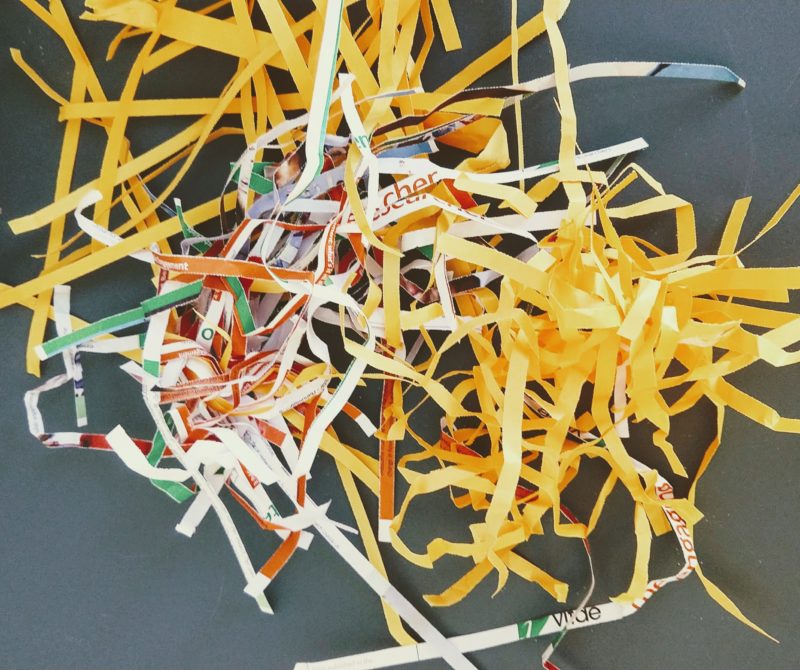
Best Practice
Good practice examples for participatory memory work in digital media ecologies are inspirational for rethinking memory making in Europe as more participatory, socially inclusive and future-envisioning. Below we collect and share best practice examples that connect people and groups and memory institutions while paying attention to recent (changing?) memory modalities.
Sorry, we couldn't find any posts. Please try a different search.
Community of Practice
POEM – Towards a Community of Practice (CoP) of Participatory Memory Work, Fostering Socially Inclusive, Future-Envisioning Memory Making in Europe
Communities of Practice (CoP) form around emerging problems or tasks of everyday life. They bring together people with varied knowledge backgrounds and levels of expertise, which matter decisively for coping with these challenges by learning from one another.
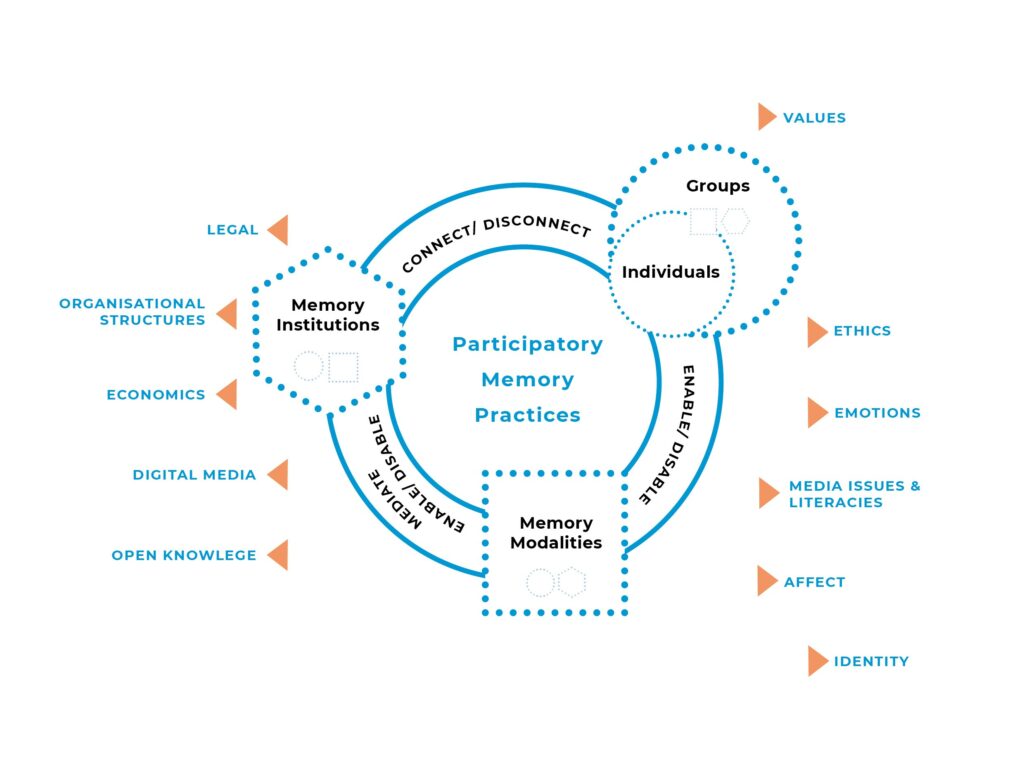
Conferences and Presentations
In order to share and to discuss their knowledge within the scientific community, all fellows gave multiple presentations at scientific conferences, organized workshops and participated in symposiums during the project. Please find a summary of all given presentations here.
AI and life after death
Lorenz Widmaier (ESR 5, CUT) took part in the online conference KI Camp 21 in Berlin by the Bundesministerium für Bildung und Forschung (BMBF) / Gesellschaft für Informatik e.V. (GI) (27 April 2021). Find more information here.
How does the intertwining of human and non-human, digital and analog affect our memories?
Quoc-Tan Tran (ESR 10, UHAM) presented his paper “An infrastructure approach to assess the potential for participatory memory-making: A case at the Prussian Cultural Heritage Foundation” at the Memory Studies Association’s Fifth Annual Conference in Warsaw (5-9 July 2021). Find more information here.
SIEF2021 15th Congress: Breaking the rules? Power, participation, transgression
The POEM project participated in the SIEF2021 15th Congress Breaking the rules? of the Société Internationale d´Ethnologie et de Folklore (SIEF) which ran as a fully virtual conference from 19th to 24th June 2021.
Prof. Dr. Gertraud Koch, Samantha Lutz, Prof. Dr. Isto Huvila and Prof. Dr. Maria Economou curated the panel “Opening-up memory making: inquiries into memory modalities in digital media ecologies I“. The panel explored modalities for opening-up memory making, as digital media ecologies promise to open-up established knowledge orders by providing new modes of participation and publicness, even though participatory memory making has not emerge by itself for people in vulnerable social situations.
The POEM Fellows Cassandra Kist and Susanne Boersma presented their research on “Connecting people, connecting practices – the potential of extending participatory work into the online realm” in the Panel on “The aftermaths and futures of participatory culture in museums and heritage sector II“, which examined participatory and collaborative cultural heritage in retrospective. It explored the aftermath of the participative turn in terms of communities, digitalities and institutions and discussed the question how it has or should break the rules of established cultural heritage practices.
See programme, panel abstract and paper abstract.
Dying, death and mourning in the focus of interdisciplinary research
Lorenz Widmaier (ESR 5, CUT) presented his work at the Museum for Sepulchral Culture in Kassel at the conference TransmortaleX (21 March 2021).
Find more information here.
Co-creation and co-production, community of interpretation, digital public participatory practices, empowerment, and overall impact on making history in museums
Quoc-Tan Tran (ESR 10, UHAM) presented his paper “Accommodating users in knowledge co-production: A case of ‘Wiki Goes MEK!’” at the international Symposium Making History Together: Participatory Practices in Museums (15 December 2020) at the Luxembourg Centre for Contemporary and Digital History (C²DH). Find more information here.
Everything Flows Festival
Myrto Theocharidou (ESR 9, CUT) participated in the talk and in the panel discussion “Happy games, happy days” with Daminos Zisimou at the digital Everything Flows Festival on the 28th of November 2020.
You can find more information here.
Online presentation of the ongoing research project by Anne Chahine (ESR 7, AU) at the panel Futures Anthropology as Interventional Theory and Practice [Future Anthropologies Network] (24 July 2020) within the conference EASA2020: New anthropological horizons in and beyond Europe.
See programme and paper abstract.
5th Biennial Conference ACHS 2020 FUTURES
The POEM project participated in the 5th Biennial Conference ACHS 2020 FUTURES of the Association of Critical Heritage Studies (ACHS) which ran as a fully virtual conference from 26th to 30th August 2020. Inge Zwart, Quoc-Tan Tran, Cassandra Kist and Suanne Boersma chaired and presented their research on “Infrastructures and future possibilities for participation”. In a second curated session, the POEM Fellows Franziska Mucha, Myrto Theocharidou, Lorenz Widmaier and Angeliki Tzouganatou discussed their preliminary findings on “Participatory memory practices: Human-centred approaches to digital heritage collections”. Anne Chahine and Asnath Kambunga were part of the stand-alone paper sessions on the sub-themes “Heritage and Time” and „Inclusive heritage through digital participation?”. The POEM-ETN was showcased in the poster presentation on “Digital Archive of Forgotten Memories: Exploring the Need to Forget Arts and Creative Practice” by Anne Chahine and Inge Zwart and in the curated session on “Digital heritage-making processes for envisioning inclusive futures” by Prof. Dr. Gertraud Koch and Samantha Lutz in collaboration with Dr. Areti Gallani (Newcastle University) and Prof. Dr. Maria Economou (University of Glasgow) in collaboration with the H2020 EU projects CoHERE and EMOTIVE.
Read the full paper here.
Infrastructural qualities of participatory memory work
Presentation titled Infrastructural qualities of participatory memory work by Quoc-Tan Tran (ESR 10, UHAM) at the Connecting Memories 2020 Symposium, organized by the University of Edinburgh, UK (29 June 2020). The Symposium was held online via Zoom. Find more information here.
Decolonizing Participatory Design: Memory making in Namibia
Presentation of paper titled Decolonizing Participatory Design: Memory making in Namibia by Asnath Paula Kambunga (ESR 6, AU), as co-author along with her supervisors Assoc.-Prof Rachel Charlotte Smith (AU), Prof Heike Winschiers-Theophilus (NUST) and other early-stage researchers at the Participatory Design Conference PDC2020 (15-19 June 2020), which was held online. In this paper, among other things, they identify theoretical and methodological gaps in PD relating to contemporary discourses of decolonizing design and explore how more far-reaching examples of decolonizing design in practice can be created. See paper and online presentation. Here, they also hosted a workshop on Decolonising Participatory Design Practices: Towards Participations Otherwise: See paper.
Co-creating Futures with Namibian youth
Presentation by Asnath Paula Kambunga (ESR 6, AU) at the Pivot Conference 2020 “Designing a World of many Centres – Towards the Pluriverse Conference” on Co-creating Futures with Namibian youth (4 June 2020). Here, she presented a project in which she worked with Namibian youth to show collaborative efforts in futures making through an interactive exhibition. The exhibition also served the purpose of showing the importance of the historical past and present in designing futures. See abstract.
Engaging children and young people in the co-production of memory through multimodal ethnographic research
Presentation by Elina Moraitopoulou (ESR 8, ASHOKA UK) of working paper titled Engaging children and young people in the co-production of memory through multimodal ethnographic research at the Remembering Children Workshop at Nottingham Trent University, UK (10-11 March 2020). The workshop dealt with the intersection of the fields of childhood and memory studies. See programme.
Digital Cultural Heritage Day at University of Uppsala
Inge Zwart (ESR 1, UU) presented her research and the POEM One Stop Shop “Digital Archive of Forgotten Memories” (OSS) at the Digital Cultural Heritage Day at the Digital Humanities Lab at UU (18 February 2020). Find more information here. ESRs Inge Zwart and Anne Chahine (ESR 7, AU) developed the concept and design for the OSS as an artistic intervention to bring ideas, discussion and research results of the network from the project to various publics and relevant stakeholder groups of the heritage sector.
Opening up Platform Economy for Accessible Digital Heritage Knowledge
Presentation of PhD project work titled Opening up Platform Economy for Accessible Digital Heritage Knowledge by Angeliki Tzouganatou (ESR 13, UHAM) at the IRS seminar Spaces of Emergence – Emergent Spaces hosted by the Leibniz Institute for Spatial Social Research in Berlin, Germany (22 January 2020). In her presentation, she discussed new business and social models for digital heritage knowledge towards an open fairer platform economy. See programme.
What do I research? Life of a PhD student
Presentation by Inge Zwart (ESR 1, UU) titled What do I research? Life of a PhD student for the master programme course Theories and Methods for ALM at Uppsala University, discussing her research project and introducing the POEM project on 14 January 2020.
Assembling infrastructures: Potentials of digital infrastructures for public engagement and participation in memory institutions
Quoc-Tan Tran (ESR 10, UHAM) presented his unpublished paper Assembling infrastructures: Potentials of digital infrastructures for public engagement and participation in memory institutions at the internal research seminar, organized by the department of ALM at the University of Uppsala (17 December 2019) during his secondment.
Co-Creating Future Memories with Greenlandic Youth: Using Participatory Methods in Visual and Design Anthropological Framework
Conference presentation on Co-Creating Future Memories with Greenlandic Youth: Using Participatory Methods in Visual and Design Anthropological Framework by Anne Chahine (ESR 7, AU) at the joint conference Changing Climates of the Canadian Anthropology Society and American Anthropological Association (CASCA-AAA) in Vancouver, Canada (20-24 November 2019), where she further chaired the session Visual Ethics and Knowledge Creation. Find more information here.
Infrastructural becoming as a provisional process: ‘What does open mean to you?’
Presentation on Infrastructural becoming as a provisional process: ‘What does open mean to you?’ by Quoc-Tan Tran (ESR 10, UHAM) at the international large-scale conference Infrastructures and Inequalities: Media Industries, Digital Cultures and Politics of the European Communication Research and Education Association (ECREA) at University of Helsinki, Finland (21-22 November 2019). See programme and full version of the abstract.
Fishbowl Discussion at 100th anniversary panel of the Institute of European Ethnology/Cultural Anthropology at the 42. Congress der Deutschen Gesellschaft für Volkskunde [Congress of the German Society for Folklore]
Quoc-Tan Tran (ESR 10, UHAM), Jennifer Krueckeberg (ESR 11, UHAM) and Angeliki Tzouganatou (ESR 13, UHAM) took part in the Fishbowl Discussion at the 100th anniversary panel of the Institute of European Ethnology/Cultural Anthropology at the 42. Congress der Deutschen Gesellschaft für Volkskunde [Congress of the German Society for Folklore]. They worked in collaboration with students as well as other doctoral and post-doctoral researchers affiliated with the institute (7-10 October 2019). Find more information here.
Cyprus Rectors Conference: 1st Doctoral Colloquium
Lorenz Widmaier (ESR 5, CUT) and Myrto Theocharidou (ESR 9, CUT) both participated in the CYPRUS RECTORS CONFERENCE: 1st Doctoral Colloquium (30 September 2019). This event brought together PhD students from different Universities of Cyprus. Myrto presented her PhD research at the conference. Lorenz also represented POEM and presented his research for the Cyprus Doctoral Network. Read more here.
Crafting the Future of the Visual Essay
Anne Chahine (ESR 7, AU) presented her research at the conference Crafting the Future of the Visual Essay of the Visual Anthropology Network of the European Association of Social Anthropologists at University of Antwerp (13 September 2019). The presentation dealt with the use of mixed media and collaborative storytelling in her own research. Find more information here.
The museum as a facilitator: stimulating integration of recent refugees in Berlin
Presentation by Susanne Boersma (ESR 4, SPK) on The museum as a facilitator: stimulating integration of recent refugees in Berlin at the ASA19: Anthropological perspectives on global challenges of the Association of Social Anthropology (3-6 September 2019). This was an academic conference that brought together different anthropological research projects and perspectives. See abstract.
The Future Memory Collection: An Online Archive and Virtual Exhibition Space
Presentation by Anne Chahine (ESR 7, AU) on The Future Memory Collection: An Online Archive and Virtual Exhibition Space at the international symposium The Nordic Eye (and Mind) meets the South. Visual Anthropology and Cultural Critique in the Nordic Countries and in Northern Cameroon at The Arctic University of Norway (26-28 August 2019). The presentation dealt with the use of web-based platforms as an online archive and virtual exhibition space in her own research. See programme here.
One Stop Shop “Digital Archive of Forgotten Memories”
A first showcase of the POEM One Stop Shop “Digital Archive of Forgotten Memories” (OSS) was held at the 20th anniversary conference What’s Missing? Collecting and Exhibiting Europe at the Museum of European Cultures in Berlin (SPK) by Inge Zwart along with the fellows Franziska Mucha (ESR 2, UGLA) and Susanne Boersma (ESR 4, SPK) (25 June 2019). Find programme here.
Divide-and-conquer – artistic strategies to curate the web
Presentation by Lorenz Widmaier (ESR 5, CUT) on Divide-and-conquer – artistic strategies to curate the web at the IIPC Web Archiving Conference at the National and University Library in Zagreb, Croatia (6-7 June 2019). He gave a talk about user generated, born-digital memories on the web and how society could make use of it. In relation to Work Package 2 of POEM, the talk asks how people can curate and preserve stories and memories online. Find out more about the conference here.
Das digitale Objekt [The digital object]
Presentation of research project focusing on user generated content as co-created digital objects by Franziska Mucha (ESR 2, UGLA) at symposium Das digitale Objekt [The digital object] about digital objects in museum collections (5 December 2018, Deutsches Museum in Munich). See programme and presentation.
Postdigital Day in Glasgow
Presentation of research project by Franziska Mucha (ESR 2, UGLA) at Postdigital Day at the University of Glasgow: Practice-based research day investigating the notion of post-digital (26 April 2019). Cassandra Kist (ESR 3, UGLA) also took part and presented on the question ‘Are museums post-digital?’. See programme.
Opening Conference POEM (Horizon 2020)
Participatory Memory Practices
Connectivities, Empowerment,
and Recognition of Cultural Heritages
in Mediatized Memory Ecologies
View the presentations, the keynotes, and the programme.
Daring Participation!
Online presentation of best practice and research project within POEM by Franziska Mucha (ESR 2, UGLA) at the workshop Daring Participation! of the H2020 REACH project (20 November 2018). See programme and presentation.
Newsletter
If you want to make sure you are up to date with POEM, please sign up to our newsletter. We will keep you informed on a regular basis via email of news from the European Training Network POEM, its partners, and projects.
Please be aware of the terms & conditions concerning data protection.
POEM
Coordination and Project Management
University of Hamburg
c/o: Institute for Anthropological Studies in Culture and History
Grindelallee 46 | postbox: H8 | 20146 Hamburg | Germany
+49 (0)40 42838-9940
Concepts, strategies and media infrastructures for envisioning socially inclusive potential futures of European Societies through culture.
This project has received funding from the European Union’s Horizon 2020 research and innovation programme under the Marie Skłodowska-Curie grant agreement No. 764859.


